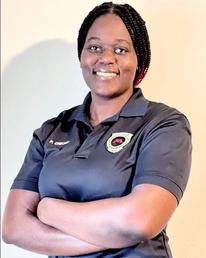The University of Minnesota works hard to ensure that campus and the surrounding neighborhoods are safe for students, faculty, staff, and visitors.
On-campus safety resources include the UMN Police Department, walking and biking security escorts, the Gopher Chauffeur, free campus shuttles, and emergency telephones. We also highly recommend downloading the Rave Guardian app when you arrive.

ISSS currently has a partnership with the UMN Police Department for an International Student Outreach Leader who shares international student concerns with UMPD. You can contact Paidamoyo Chikate to learn more about safety at UMN and share any concerns you may have.
For more information, contact [email protected].
Stay Informed
Crime Alerts
The University of Minnesota will email Crime Alerts to the campus community when certain crimes occur on University property or in areas adjacent to campus. These alerts, required by the federal government, inform the public when there is an ongoing threat to public safety. All University students will automatically receive these alerts.
SAFE-U
Sign up for SAFE-U if you would like to receive text messages whenever there is a dangerous condition on campus or when the campus is closes due to weather. These messages will include clear instructions about any action you should take due to the situation, such as buildings to avoid. All students, faculty, and staff are automatically registered with the TXT-U system, but you can opt-out or change your number in MyU under My Info.
Outdoor Warning System
In certain circumstances, the University of Minnesota Police Department will use a public address system to broadcast alerts.
The outdoor sirens are also tested once a month on the first Wednesday of the month at 1 p.m. This is only a test, and it does not indicate bad weather or other causes for concern.
Safe Campus
Visit the Safe Campus website for resources about the various safety initiatives occurring on campus.
Personal Safety
UMN Specific Tips
- Track buses using the GopherTrip app so you know when the next bus will arrive.
- Request a Gopher Chauffeur using their new free app; call the 624-WALK program or Safety Guides in Dinkytown for an escort home; use Gopher Rideshare to find someone going your way; and download the Rave Guardian app.
- Use blue light emergency kiosks around campus to be directly connected with 911 if you or others around you need help.
- Campus Maps: Click on the icons in the upper left to find walking and biking safety information, bus routes, and other helpful information to help you navigate the campus safely, including maps of the Gopher Way tunnel system.
- Follow winter weather precautions. If severe weather occurs, any changes to campus operations will be sent through SAFE-U notifications.
- Learn practical strategies to get out of potentially dangerous situations and practice easy self-defense techniques in a free self-defense workshop from the Department of Public Safety.
General Safety Tips
The Minneapolis/St. Paul area is considered a safe place to live, but as a large urban area, it is not free from crime.
Below is a list of ways you can increase your personal safety. More suggestions are available on the Safe Campus website.
- If you are traveling alone, you can request a Gopher Chauffeur using their new free app; call the 624-WALK program (612-624-9255) or Safety Guides in Dinkytown for an escort home; use Gopher Rideshare to find someone going your way; and download the Rave Guardian app.
- Always pay attention to your surroundings. If something does not feel or look right, use caution.
- Try to walk home with at least one other person and stay on well-lit streets. If alone, look confident and walk briskly.
- Avoid using headphones while walking or running, as they may decrease your ability to hear noises around you. For example, someone could easily approach you from behind or you may not be able to hear an oncoming car.
- If you sense that someone is following you, go to a populated area.
- Do not carry your passport around campus to use as ID. You should be able to use your U Card on campus, and your passport should be locked in a safe place when not needed.
- Do not leave any valuables—your backpack, purse, or cellphone—unattended.
- Lock your room whenever you leave it, as well as at night when you are studying or sleeping.
- If you feel threatened or harassed, talk to an ISSS counselor. They are trained to help students in this situation.
911
If you feel you are in danger or require emergency/police help, notify the police by calling 911 on any phone. Your call will be directed to a 911 dispatcher who will send the necessary help to you (police, ambulance, or firefighters). If your cell phone is an international phone, you will need to let them know that you are in Minnesota. 911 calls get routed to the nearest cell tower based on their phone service.
911 is for use in emergency situations only, and it should not be use in non-emergency situations. If you are calling for non-emergency events you could be holding up the phone line for someone who is actually hurt or needs help. Reasons to call 911 include:
- Report a fire
- Report a car accident
- Call for help because of an injury/medical emergency
- Report a crime, especially one in progress
- When you feel like you are in danger
Police, fire, and hospitals all have non-emergency phone numbers that you can call for other reasons. They can be found online.
Scams and Identity Theft
International students and immigrants are often targeted by phone and email scams. These criminals often make threats and/or pose as local law enforcement or a federal agent in an attempt to scare the individual so that they will pay the caller money or share their personal information. Frequently, scam artists use software to change the information shown on caller ID to real government phone numbers like the U.S. Citizenship and Immigration Services or even 911.
The number of scams can increase around times immigrants or international students are particularly vulnerable. For example, we often receive reports from international students at the beginning of the school year, during tax season or when there are changes in immigration policies.
Know that:
- Law enforcement agencies will NEVER call to warn that you could be arrested or fined.
- These agencies will NEVER call to demand an immediate payment over the phone, and they WILL NOT ask for your credit or debit card number over the phone.
- NEVER open, respond to, or click on links in a suspicious email (even if it appears to be from an official source). The University of Minnesota will NOT ask you to provide personal information in email or on an unsecured website.
- Do NOT use unsecured wi-fi networks to do shopping or other activities where you will provide financial information.
- You should ALWAYS shred credit card applications, bank statements, and other financial paperwork before putting them in the recycling or trash.
If you receive a phone call or email from someone stating you could be arrested or jeopardize your immigration status if you do not pay them money or give them your personal information, IT IS FAKE. Do not pay them money, even if your caller ID shows the name or phone number of USCIS or a law enforcement agency.
What You Should Do If You Are Contacted
- If you receive a threatening phone call or email, please visit our office during Walk-In Hours or email [email protected]. We can help you report the call, and we want to gather information about these scams and provide support to people who have been affected.
- If you have already paid money or become a victim of a phone or email scam, contact the UMN Police Department (612-624-2677).
- If you received a phone call but did not pay money, report the call to Federal Trade Commission
- If you receive a suspicious email from a umn.edu account, forward it to [email protected] and then delete it.
